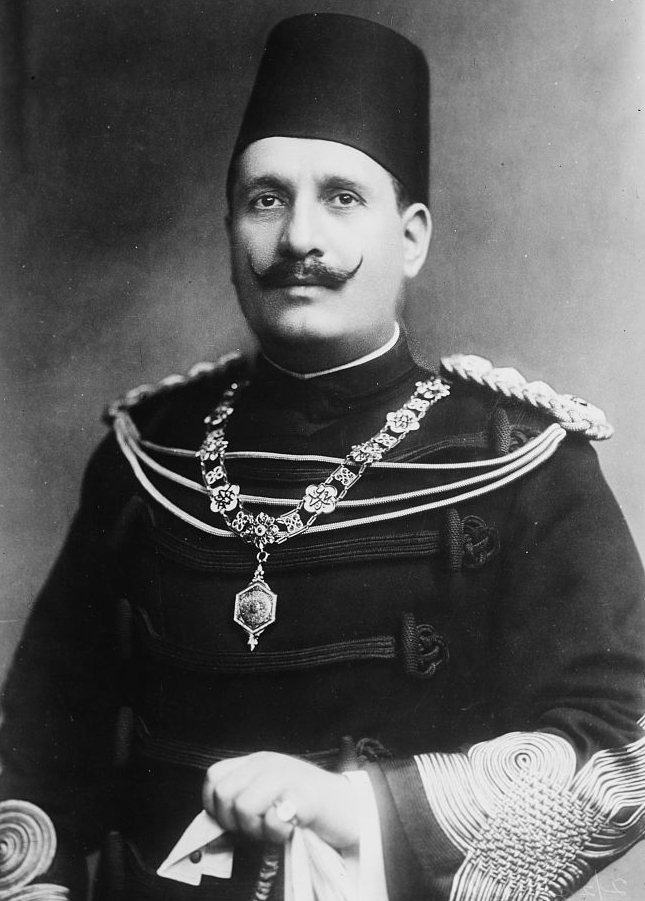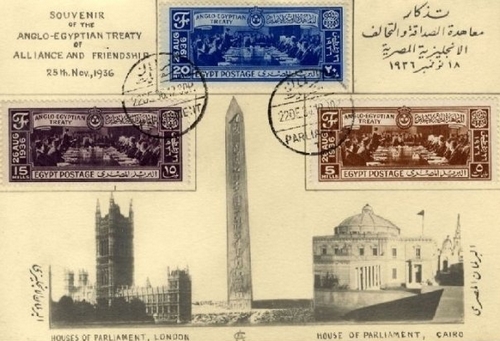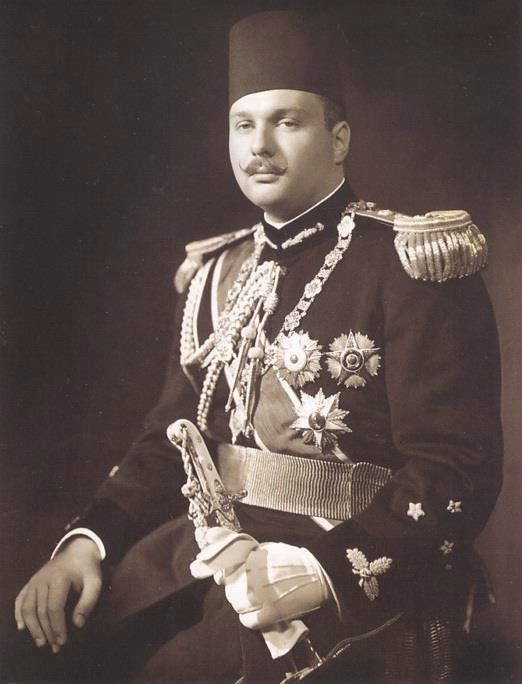|
King Of Egypt
King of Egypt (), officially referred to as, King of Egypt, Sovereign of Nubia, Sudan, Kordofan, and Darfur, was the title used by the Head of State in Egypt between 1922 and 1953. When the United Kingdom issued the Unilateral Declaration of Egyptian Independence on 28 February 1922, thereby ending its protectorate over Egypt, Egypt's Sultan Fuad I issued a decree on 15 March 1922 whereby he adopted the title of ''King of Egypt''. It has been reported that the title change was due not only to Egypt's newly independent status, but also to Fuad I's desire to be accorded the same title as the newly installed rulers of the newly created kingdoms of Hejaz, Syria and Iraq. The second monarch to be styled ''King of Egypt'' was Fuad I's son Farouk I, whose title was changed to '' King of Egypt and the Sudan'' in October 1951 following the Wafdist government's unilateral abrogation of the Anglo-Egyptian Treaty of 1936. The monarchy was abolished on 18 June 1953 following the Egyptian ... [...More Info...] [...Related Items...] OR: [Wikipedia] [Google] [Baidu] |
King
King is a royal title given to a male monarch. A king is an Absolute monarchy, absolute monarch if he holds unrestricted Government, governmental power or exercises full sovereignty over a nation. Conversely, he is a Constitutional monarchy, constitutional monarch if his power is restrained by fixed laws. Kings are Hereditary monarchy, hereditary monarchs when they inherit power by birthright and Elective monarchy, elective monarchs when chosen to ascend the throne. *In the context of prehistory, antiquity and contemporary indigenous peoples, the title may refer to tribal kingship. Germanic kingship is cognate with Indo-European languages, Indo-European traditions of tribal rulership (cf. Indic ''rājan'', Gothic ''reiks'', and Old Irish ''rí'', etc.). *In the context of classical antiquity, king may translate in Latin as ''rex (king), rex'' and in Greek as ''archon'' or ''basileus''. *In classical European feudalism, the title of ''king'' as the ruler of a ''kingdom'' is und ... [...More Info...] [...Related Items...] OR: [Wikipedia] [Google] [Baidu] |
Darfur
Darfur ( ; ) is a region of western Sudan. ''Dār'' is an Arabic word meaning "home f – the region was named Dardaju () while ruled by the Daju, who migrated from Meroë , and it was renamed Dartunjur () when the Tunjur ruled the area. Darfur was an independent sultanate for several hundred years until 1874, when it fell to the Sudanese warlord Rabih az-Zubayr. The region was later invaded and incorporated into Sudan by Anglo-Egyptian forces in 1916. Richard Cockett Sudan: Darfur and the failure of an African state. 2010. Hobbs the Printers Ltd., Totten, Hampshire. As an administrative region, Darfur is divided into five federal states: Central Darfur, East Darfur, North Darfur, South Darfur and West Darfur. Because of the War in Darfur between Sudanese government forces and the indigenous population, the region has been in a state of humanitarian emergency and genocide since 2003. The factors include religious and ethnic rivalry, and the rivalry between farm ... [...More Info...] [...Related Items...] OR: [Wikipedia] [Google] [Baidu] |
Library Of Congress Country Studies
The Country Studies are works published by the Federal Research Division of the United States Library of Congress, freely available for use by researchers. No copyright is claimed on them. Therefore, they have been dedicated to the public domain and can be copied freely, though not all the pictures used therein are in the public domain. The Country Studies Series presents a description and analysis of the historical setting and the social, economic, political, and national security systems and institutions of countries throughout the world. The series examines the interrelationships of those systems and the ways they are shaped by cultural factors. The books represent the analysis of the authors and should not be construed as an expression of an official United States Government position, policy, or decision. The authors have sought to adhere to accepted standards of scholarly objectivity. Online information contained in the online Country Studies is not copyrighted and thus is ... [...More Info...] [...Related Items...] OR: [Wikipedia] [Google] [Baidu] |
Anglo-Egyptian Treaty Of 1936
The Anglo-Egyptian Treaty of 1936 (officially, ''The Treaty of Alliance Between His Majesty, in Respect of the United Kingdom, and His Majesty, the King of Egypt'') was a treaty signed between the United Kingdom and the Kingdom of Egypt. The treaty significantly reduced Britain's influence in Egypt's domestic policy but Britain still had significant influence in Egypt's foreign policy and defense, especially the Suez Canal. Under the terms of the treaty, the United Kingdom was required to withdraw all its troops from Egypt, except those necessary to protect the Suez Canal and its surroundings, numbering 10,000 troops plus auxiliary personnel. Additionally, the United Kingdom would supply and train Egypt's army and assist in its defense in case of war. The treaty was to last for 20 years; it was negotiated in the Zaafarana palace, signed in London on 26 August 1936 and ratified on 22 December. It was registered in the League of Nations Treaty Series on 6 January 1937. B ... [...More Info...] [...Related Items...] OR: [Wikipedia] [Google] [Baidu] |
Wafd Party
The Wafd Party (; , ''Ḥizb al-Wafd'') was a nationalist Liberalism, liberal political party in Egypt. It was said to be Egypt's most popular and influential political party for a period from the end of World War I through the 1930s. During this time, it was instrumental in the development of the 1923 Constitution of Egypt, 1923 constitution, and supported moving Egypt from Muhammad Ali Dynasty, dynastic rule to a constitutional monarchy, where power would be wielded by a nationally-elected parliament. The party was dissolved in 1952, after the Egyptian Revolution of 1952, 1952 Egyptian Revolution. History Rise The Wafd party was an Egyptian nationalism, Egyptian nationalist movement that came into existence in the aftermath of World War I. Although it was not the first nationalist group in Egypt, it had the longest lasting impact. It was preceded and influenced by smaller and less significant movements which evolved over time into the more modern and stronger nationalist Wafd ... [...More Info...] [...Related Items...] OR: [Wikipedia] [Google] [Baidu] |
King Of Egypt And The Sudan
King of Egypt and the Sudan ( ') was the title used by the Egyptian monarch from 16 October 1951 until the abolition of the monarchy on 18 June 1953. It was replaced by the President of Egypt. In 1951, the Egyptian Parliament amended the Constitution by Law 176 of 16 October 1951 to provide that the title of the King should be "King of Egypt and the Sudan" instead of "King of Egypt, Sovereign of Nubia, Sudan, Kordofan, and Darfur". This move came in the wake of Wafdist Prime Minister Nahhas Pasha's decision to unilaterally abrogate the Anglo-Egyptian Treaty of 1936. The change in King Farouk I's title was intended to further Egypt's claims over the Sudan, which had been an Anglo-Egyptian condominium since 1899. The title had long been used by Egyptian nationalists to emphasize their desire for the unity of the Nile Valley. For instance, expatriate Egyptian students in France greeted Farouk I during his 1937 tour of Europe by proclaiming "Long live the King of Egypt and Sudan" ... [...More Info...] [...Related Items...] OR: [Wikipedia] [Google] [Baidu] |
Farouk Of Egypt
Farouk I (; ''Fārūq al-Awwal''; 11 February 1920 – 18 March 1965) was the tenth ruler of Egypt from the Muhammad Ali dynasty and the penultimate King of Egypt and the Sudan, succeeding his father, Fuad I, in 1936 and reigning until his overthrow in a military coup in 1952. His full title was "His Majesty Farouk I, by the grace of God, King of Egypt and the Sudan". As king, Farouk was known for his extravagant playboy lifestyle. While initially popular, his reputation eroded due to the corruption and incompetence of his government. He was overthrown in the 1952 coup d'état and forced to abdicate in favour of his infant son, Ahmed Fuad, who succeeded him as Fuad II. Farouk died in exile in Italy in 1965. His sister, Princess Fawzia bint Fuad, was the first wife and consort of the Shah of Iran, Mohammad Reza Pahlavi. Early life and education He was born as ''His Sultanic Highness'' Farouk bin Fuad, Hereditary Prince of Egypt and Sudan, on 11 February 1920 (Jumada al ... [...More Info...] [...Related Items...] OR: [Wikipedia] [Google] [Baidu] |
Al-Ahram Weekly
''Al-Ahram Weekly'' is an English-language weekly broadsheet printed by the Al-Ahram Publishing House in Cairo, Egypt. History and profile ''Al Ahram Weekly'' was established in 1991 by the ''Al-Ahram'' newspaper, which also runs a French-language weekly version, '' Al-Ahram Hebdo''. Between 1991 and 2003, founder Hosni Guindi, served as the editor-in-chief An editor-in-chief (EIC), also known as lead editor or chief editor, is a publication's editorial leader who has final responsibility for its operations and policies. The editor-in-chief heads all departments of the organization and is held accoun ... and Hani Shukrallah as managing editor and co-founder Mona Anis as deputy editor-in-chief. After Hosni's death in 2003, Shukrallah succeeded him as acting editor. In 2005 Egypt's Shura Council appointed Assem El-Qersh as the paper's editor-in-chief, replacing Shukrallah. In June 2014, Galal Nassar was appointed editor-in-chief of the weekly. The circulation of the magazine ... [...More Info...] [...Related Items...] OR: [Wikipedia] [Google] [Baidu] |
Kingdom Of Iraq
The Hashemite Kingdom of Iraq was the Iraqi state located in the Middle East from 1932 to 1958. It was founded on 23 August 1921 as the Kingdom of Iraq, following the defeat of the Ottoman Empire in the Mesopotamian campaign of the First World War. Although a League of Nations mandate was awarded to the United Kingdom in 1920, the 1920 Iraqi revolt resulted in the scrapping of the original mandate plan in favour of a formally sovereign Iraqi kingdom, but one that was under effective British administration. The plan was formally established by the Anglo-Iraqi Treaty. The role of the United Kingdom in the formal administration of the Kingdom of Iraq was ended in 1932, following the Anglo-Iraqi Treaty (1930). Now officially a fully independent kingdom, officially named the Hashemite Kingdom of Iraq, it underwent a period of turbulence under its Hashemite rulers throughout its entire existence. Establishment of Sunni religious domination in Iraq was followed by Assyrian, Yazidi ... [...More Info...] [...Related Items...] OR: [Wikipedia] [Google] [Baidu] |
King Of Syria
The title King of Syria appeared in the second century BC in referring to the Seleucid kings who ruled the entirety of the region of Syria. It was also used to refer to Aramean kings in the Greek translations of the Old Testament, mainly indicating the kings of Aram-Damascus. Following the defeat of the Ottoman Empire in World War I, the region came under the rule of France, the United Kingdom and Prince Faisal of Hejaz, who was proclaimed King of Syria on 8 March 1920. Faisal's reign lasted a few months before he was overthrown by France and the title fell out of use. Background The term Syria was first applied by Herodotus in the 5th century BC to indicate a region generally extending between Anatolia and Egypt. With the advent of the Hellenistic period, Greeks and their Seleucid dynasty used the term "Syria" to designate the region between the Mediterranean and the Euphrates. The usage of the name in referring to the region during the Iron Age (ended 586 BC) is a modern prac ... [...More Info...] [...Related Items...] OR: [Wikipedia] [Google] [Baidu] |
Kingdom Of Hejaz
The Hashemite Kingdom of Hejaz (, ''Al-Mamlakah al-Ḥijāziyyah Al-Hāshimiyyah'') was a state in the Hejaz region of Western Asia that included the western portion of the Arabian Peninsula that was ruled by the Hashemite dynasty. It was self-proclaimed as a kingdom in June 1916 during the First World War, to be independent from the Ottoman Empire, on the basis of an alliance with the British Empire to drive the Ottoman Army from the Arabian Peninsula during the Arab Revolt. The British government had promised Hussein bin Ali, King of Hejaz, a single independent Arab state that would include, in addition to the Hejaz region, modern-day Jordan, Iraq, and most of Syria, with the fate of the Palestine region (today's Israel and Palestine) being mentioned in more ambiguous terms. However, at the end of the First World War, the Treaty of Versailles turned Syria into a French League of Nations mandate and Iraq, Mandate Palestine and Transjordan into British mandates. Hashemi ... [...More Info...] [...Related Items...] OR: [Wikipedia] [Google] [Baidu] |
History Of Egypt Under The British
The history of Egypt under the British lasted from 1882, when it was occupied by British forces during the Anglo-Egyptian War, until 18 June 1956, when the last British forces withdrew in accordance with the 1954 Anglo-Egyptian evacuation agreement, Anglo-Egyptian evacuation agreement of 1954. The first period of British rule (1882–1914) is often called the "veiled protectorate". During this time the Khedivate of Egypt remained an autonomous province of the Ottoman Empire, and the British occupation had no legal basis but constituted a ''de facto'' protectorate over the country. Egypt was thus not part of the British Empire. This state of affairs lasted until 1914 when the Ottoman Empire joined World War I on the side of the Central Powers and Britain declared a British protectorate, protectorate over Egypt. The ruling khedive, Abbas II of Egypt, Abbas II, was deposed and his successor, Hussein Kamel of Egypt, Hussein Kamel, compelled to declare himself Sultanate of Egypt, Su ... [...More Info...] [...Related Items...] OR: [Wikipedia] [Google] [Baidu] |







